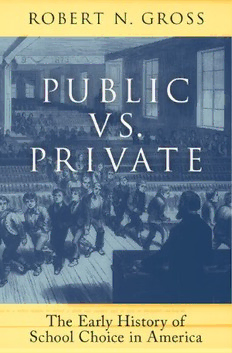
Public vs. private: the early history of school choice in America PDF
Preview Public vs. private: the early history of school choice in America
public vs. private Public vs. Private The Early History of School Choice in America Robert N. Gross 1 1 Oxford University Press is a department of the University of Oxford. It furthers the University’s objective of excellence in research, scholarship, and education by publishing worldwide. Oxford is a registered trade mark of Oxford University Press in the UK and certain other countries. Published in the United States of America by Oxford University Press 198 Madison Avenue, New York, NY 10016, United States of America. © Oxford University Press 2018 All rights reserved. No part of this publication may be reproduced, stored in a retrieval system, or transmitted, in any form or by any means, without the prior permission in writing of Oxford University Press, or as expressly permitted by law, by license, or under terms agreed with the appropriate reproduction rights organization. Inquiries concerning reproduction outside the scope of the above should be sent to the Rights Department, Oxford University Press, at the address above. You must not circulate this work in any other form and you must impose this same condition on any acquirer. Library of Congress Cataloging- in- Publication Data Names: Gross, Robert N., author. Title: Public vs. private : the early history of school choice in America / Robert N. Gross. Description: New York, NY : Oxford University Press, [2018] | Includes bibliographical references and index. Identifiers: LCCN 2017029075 (print) | LCCN 2017030417 (ebook) | ISBN 9780190644581 (updf) | ISBN 9780190644598 (epub) | ISBN 9780190644604 (online component) | ISBN 9780190644574 (hardback : alk. paper) Subjects: LCSH: School choice—United States—History. | Public schools—United States—History. | Private schools—United States—History. | Education—United States—History. Classification: LCC LB1027.9 (ebook) | LCC LB1027.9 .G76 2018 (print) | DDC 379.1/11—dc23 LC record available at https://lccn.loc.gov/2017029075 9 8 7 6 5 4 3 2 1 Printed by Sheridan Books, Inc., United States of America For Natalie Contents Acknowledgments ix Introduction: Private Schools and Public Regulation in American History 1 1. Public Monopoly 9 2. Competing Schools 26 3. Educational Regulation 46 4. Public Policy and Private Schools 62 5. Creating the Educational Marketplace 83 6. Fighting the Educational Monopoly 105 Epilogue: Public Problems and Private Education in the Post- World War II Era 125 Notes 137 Bibliography 179 Index 195 vii Acknowledgments This book would not have been possible without the many teachers, students, col- leagues, friends, and family members, who instilled in me a passion for the past. First and foremost is Bill Reese, who guided me through graduate school with generosity, trust, kindness, and rigor. I am immensely privileged to have worked with Bill, and since wind- ing up in Washington, DC, am fortunate to be able to see him frequently during his many trips out east. I am also indebted to my undergraduate mentor, Mary Ann Dzuback, who introduced me to the history of education, and to the careful practice of historical scholarship. Throughout the production of this manuscript I have received feedback from truly excellent historians and mentors. At the University of Wisconsin, Adam R. Nelson and Jennifer Ratner- Rosenhagen helped develop my abilities as a researcher and teacher since the beginning of graduate school, and were instrumental in helping me think through how to frame this book’s questions and arguments. Colleen Dunlavy and Julie Mead generously lent their expertise in business history and education law to this project, and Jeremi Suri’s guidance in the initial stages of the manuscript helped get me started. Comments at conferences on my presented work from Ruben Donato, Ruben Flores, Carl Kaestle, Kip Kosek, John Modern, Tracy Steffes, Maris Vinovskis, and Jonathan Zimmerman were also immensely helpful. Colleagues throughout the country were equally instrumental in helping take this project to the finish line. Frank Honts, Campbell Scribner, and Christine Lamberson, in addition to being dear friends, are exemplary scholars and professionals, whose intellec- tual habits and precise feedback have deeply influenced me. Britt Tevis helped me clarify ix
